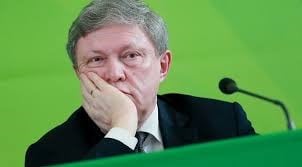On December 30, 2016, the newspaper Kommersant published an analysis by Maria-Luisa Tirmaste on the hapless Russian democratic opposition. While the managed democracy system in Russia poses severe obstacles to a democratic opposition, Russian democrats also share responsibility for their poor showing in the September Duma elections. They failed to unite before the elections and even after their electoral debacle they continue to feud and will not unite around a single candidate in the 2018 presidential candidate. As a result many have despaired of the party route and are considering social movements or émigré activity.
Below are excerpts from the Kommersant analysis:
The Democratic Coalition That Arose After The Nemtsov Assassination Has Fallen Apart
"The Democratic opposition not only was unable to unify in the Duma elections but in their follow-up they fractured into small groups. It is obvious that in the 2018 presidential elections it will not succeed in putting forward a unity candidate.
"After the February 27, 2015 murder of Boris Nemtsov[1] it appeared that the unification of the opposition was inevitable – the Rubicon had been crossed. However, the September 18, 2016 Duma elections showed that in contemporary Russia this is never going to happen. Towards spring, when it was imperative to take a decision on putting forth candidates for the Duma elections, the opposition already found itself in [internal] confrontation. Yabloko[2] earlier put forward Grigory Yavlinsky as a candidate for the 2018 presidential elections. [Meanwhile] the democratic coalition formed in 2015 placed PARNAS leader Mikhail Kasyanov[3] at the top of its list for the Duma elections [a clear indication that Kasyanov would also be its presidential candidate]. Moreover, the Yabloko political committee defined PARNAS as a competitor and decided that they would invite only those who committed to support Grigory Yavlinksy in the presidential election.

Grigory Yavlinksy (source: Novo-tomsk.ru)
In early summer, when the parties officially began submitting their list for the Duma elections, not only did the democratic coalition splinter, but a split also occurred within PARNAS on whose basis the democrats had to go to the Duma [elections]. The trigger was the [sex sting] film ". Kasyanov Day" shown on [Kremlin friendly] NTV where Mr. Kasyanov and his girlfriend [British citizen] Natalya Pelevine made unflattering remarks about their friends in the party and coalition including Alexey Navalny and Mr. Kasyanov admitted that he had constructed the party for Ms. Pelevine. Kasyanov rejected the demands by members of the democratic coalition and from within his own party that he participate in the primaries and renounce the reserved first spot on the party list. As a result, Alexey Navalny's Party of Progress bolted the democratic coalition...and PARNAS put in the number two spot on the list the nationalist Vyacheslav Maltsev.

Mikhail Kasyanov (Source: Rt.com)
The democrats went to the Duma elections with two heads – Yabloko which included in its list the ex PARNAS co-chairman Vladimir Ryzhkov, a friend of Alexey Navalny... and PARNAS headed by Mikhail Kasyanov. As a result the democrats, who have been absent from the Duma since 2003 did not land there again. Yabloko took 1.9%, PARNAS 0.7%. Such results did not alter the decision of Grigory Yavlinsky, who headed the Yabloko list to the Duma to run in the presidential elections. The readiness of Alexey Navalny to run for president likewise did not change Mr. Yavlinsky's plans. Mikhail Kasyanov announced at the same time that under current conditions he would not stand for office and [the candidate] whom his party would support would be decided at the approach of elections. However, by that time PARNAS could either have ceased to exist or have remained only a fan club of Mikhail Kasyanov… Mikhail Kasyanov's unwillingness to admit his mistakes in placing nationalists on the democratic party list and likewise his refusal to give up exclusive control of the party brought about the result that in December, a group of Boris Nemtsov's comrades left PARNAS… Many of them announced that they would continue political activity in the Solidarity movement of which Boris Nemtsov was a founder. In February, they plan to conduct a meeting of Solidarity in which they will renew the leadership, adopt an action program and delineate a presidential campaign strategy.
"As a result of the turf war amongst Russian democrats in 2016, new opposition groups have formed. One of them is comprised of political émigrés who are conducting activity. In November, Mikhail Khodorkovsky[4] conducted a founding conference of the Open Russia movement and headed it. Zhanna Nemtsov as a founder of the Boris Nemtsov Freedom Fund in his memory conducted a forum in Berlin at which many Russian opposition figures and European politicians participated. As the goal of yet another Boris Nemtsov forum – at the European Parliament attended by its speaker Martin Schulz – Mikhail Khodorkovsky and Zhanna Nemtsov called for the establishment of a Russian-European dialogue. This included establishing communication between representatives of Russian civil society and the European political structure bypassing the Kremlin. Mr. Khodorkovsky does not plan to run himself in the presidential elections. He launched a project "Instead of Putin" with whose help he expects to find a candidate for the presidency 'out of a number of young politicians'. He still does not want to name the 'ideal candidate'."
[1] Nemtsov,former vice-prime minister and liberal politician was assassinated in view of the Kremlin. Five Chechens were arrested for the murder but suspicion remains that they were merely small-fry and higher level figures were involved in an effort to intimidate opposition politicians.
[2] Yabloko (Russian for Yabloko) was a liberal party formed in the early 1990s. Its high water mark was the 1993 elections when it captured nearly 8% of the vote. It is led by Grigory Yavlinsky.
[3] Kasyanov, a former Russian prime minister (2000-2004) heads PARNAS the People's Freedom Party.
[4] A former oligarch and owner of oil giant Yukos, who fell afoul of Putin and was imprisoned on trumped up charges.





